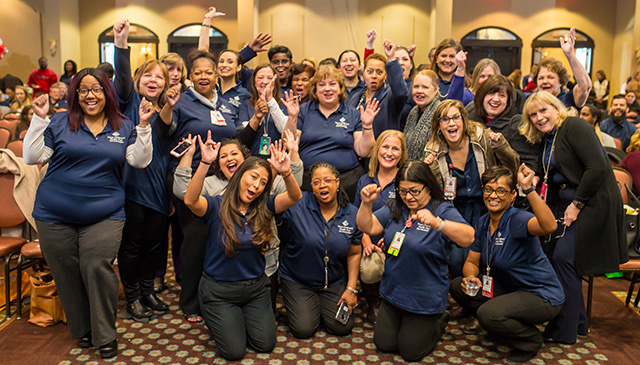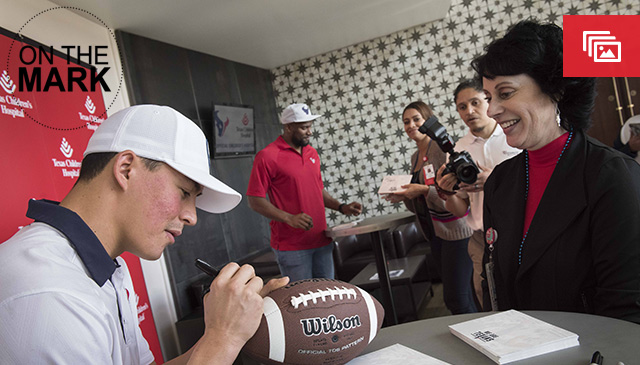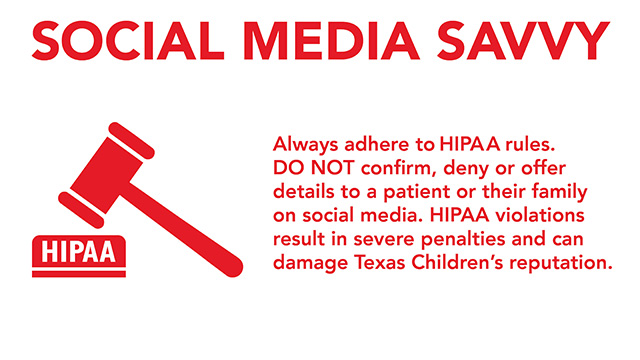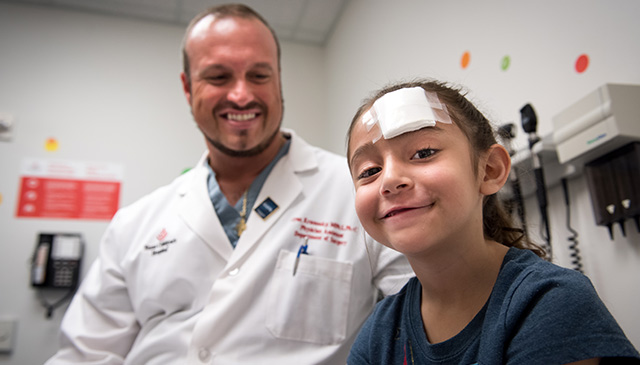
As a Texas Children’s employee, it is important to make informed, thoughtful decisions about what you choose to post online. Learn more about how to be social media savvy. Read more

As a Texas Children’s employee, it is important to make informed, thoughtful decisions about what you choose to post online. Learn more about how to be social media savvy. Read more
Hosted by Cox Media Group Houston, the two-day event will be held December 12 and 13 on the third floor of the Pavilion for Women near the Bistro Café.
Throughout the 48-hour period, people are encouraged to open their hearts and wallets in support of the radiothon while listening to radio personalities from The Eagle (106.9 & 107.5), Country Legends (97.1) and The New 93Q (92.9) interview patients, their families and many of our clinical experts.
Every dollar donated to the radiothon will help Texas Children’s continue to fulfill its mission to create a healthier future for children and women throughout our global community by leading in patient care, education and research. More specifically, the money will benefit Texas Children’s Cancer Center.
For more information about the Cox Media Group Houston Radiothon, click here.

No one working in healthcare today would say that it is easy. And children’s hospitals are even more complex: we must wrap our arms around not only our patients, but their families (and teachers, school nurses, caregivers, and others). Overcoming these unique challenges yields extraordinary rewards – for kids, families, and communities – so it’s worth it. Building healthier futures is why we do what we do.
Delivering Texas Children’s-quality healthcare requires unparalleled care-coordination. As emphasized in Planning a Patient’s Care (one key element of Care Coordination), this means recognizing potential barriers to care and addressing them in advance.
“This particular element sets an expectation to look at each patient’s individual needs and take the time to understand the clinical and non-clinical resources that are required and available, “ said Dr. Katie Ostermaier, medical director at Texas Children’s Health Plan and a Care Coordination team lead. “It sounds simple, but what it really demands is that we build relationships with the right partners and deliver resources in way that is proactive and well thought-out.” Ostermaier compared care coordination to a village raising a child: “Someone in the village must be thinking in advance about everything that child will need in the future and the best way to deliver it.”
The same applies to Texas Children’s. Sterling care coordination requires:
Both clinical and non-clinical employees are critical to this work. Care Coordination is a priority for each and every member of our One Amazing Team.
Do you or someone you work with coordinate care well? Tell us how by sending a note to connect@texaschildrens.org. We want to hear from you!
Want to know more about Care Coordination? Reach out to Andrea Romay, senior project manager for Care Coordination at maromayd@texaschildrens.org or 832-824-7831.

Another Leadership Maxim series has come to a close, highlighting amazing leadership throughout the organization through a series of guest blogs on On The Mark. To celebrate the finale, about 100 employees who participated in the series or commented on the blogs in the series attended a private event with the Houston Texans that included a behind-the-scenes tour of NRG Stadium, an autograph session with two Houston Texans football players and photos with Texans cheerleaders. The event was held on December 3. Read more
On Monday, Texas Children’s closed on the purchase of two plots of land in Austin – Presidio to the north and Estancia to the south (click on image to see both plots). This additional investment into the Austin community is yet another example of our commitment to expand our expert pediatric and maternal care to more conveniently serve the families of central Texas.
“In June 2017, we first announced plans to extend our brand of pediatric and maternal care to the Austin community,” President and CEO Mark Wallace said. “Eighteen months later, we have 62 employees and 23 physicians in Austin helping to deliver on our mission and intention of caring for the children and families in need of the expert care we provide, closer to home.”
Texas Children’s is constantly exploring options and assessing the needs of children and women in the community to help fill gaps in care where they exist. Currently, there are no confirmed plans for the use of this land.
“We know Austin continues to be one of the fastest growing cities in the nation, and our goal is to help supplement and add value to the great health care options already available to Austin-area families,” Executive Vice President Michelle Riley-Brown said.
The organization’s first health care location in Austin, Texas Children’s Urgent Care Westgate, opened in March 2018 and provides high-quality, efficient and affordable pediatric-focused care after hours and on weekends. Located at 4477 South Lamar Blvd., suite 400, Texas Children’s Urgent Care is staffed by board-certified pediatricians and nurses, with facilities and equipment designed specifically to meet the needs of children and adolescents up to age 18.
Additionally, Texas Children’s Pediatrics, the nation’s largest pediatric primary care network, currently has five practices in Austin which provide full-service care for children including, among other offerings, prenatal counseling; newborn and infant care; well and sick child visits; immunizations; and hearing and vision screenings; as well as camp, school and sports physicals. Building upon its 20 plus years of experience working with community pediatricians, Texas Children’s Pediatrics continues to partner with existing pediatric primary care practices in the region. Currently, Texas Children’s Pediatrics locations in Austin include:
In October 2018, Texas Children’s Specialty Care Austin opened bringing the hospital’s own subspecialty pediatric care to the Austin community. Located at 8611 North MoPac, suite 300, Texas Children’s Specialty Care helps increase access for children and families in need of allergy and immunology, cardiology, clinical nutrition, diabetes and endocrinology, ophthalmology, plastic surgery, and pulmonology, among other subspecialties. Additional pediatric subspecialties will be added in the coming months to help serve the growing needs of the Austin community and the state of Texas.

As a Texas Children’s employee, it is important to make informed, thoughtful decisions about what you choose to post online. Learn more about how to be social media savvy. Read more

For the past two years, increasing access to care has been one of the central goals across the Texas Children’s system, resulting in several new programs and initiatives.
The most recent example was on December 2, when the Department of Surgery took yet another major stride in its effort to provide patients and families with even more access to Texas Children’s surgical care through the launch of the new After Hours Clinic for Surgical Care.
The After Hours Clinic is now open Monday through Friday, 5 p.m. to 7 p.m., on the eighth floor of Mark A. Wallace Tower, and is staffed by the Surgical APP Hospitalist Team, which currently cares for surgical patients in the Texas Children’s Emergency Center (EC) and inpatient areas.
This clinic provides access to care for post-surgical patients or those who need to be seen quickly for a large range of non-emergency or non-urgent medical issues.
“There are many situations, particularly in the early postoperative period, in which parents feel the need to have a surgical provider evaluate their child,” said Texas Children’s Surgeon-in-Chief Dr. Larry Hollier. “Often this is just for reassurance or to provide additional instructions or guidance. The After Hours Clinic is designed primarily for families who feel they cannot wait to be seen until the following day.”
In addition to convenient clinic hours, patients and families will benefit from the relative low cost of clinic visits compared with visits to the EC or to urgent care. Usually a visit to the After Hours Clinic will cost the same as a regular clinic visit; and for post-surgical patients, it may even be covered within the global period.
Staff within surgical divisions can directly schedule patients to the After Hours Clinic in Epic. And in the coming months, pediatricians and families will be able to schedule as well by calling 832-822-2778.
When: Monday through Friday, 5 p.m. to 7 p.m.
Where: Mark A. Wallace Tower, eighth floor
Who is eligible?
What types of conditions are treated?
What kinds of patients should be sent to an EC?
Who sees the patients?
Surgical Advanced Practice Providers (APPs) on the dedicated Surgical APP Hospitalist Team. The Surgical APP Hospitalist Team is cross trained in Pediatric General Surgery, ENT, Urology, Orthopedics and Plastic Surgery. While surgeons and physicians are not physically present during clinic hours, they will be contacted as appropriate.
How is a visit to the After Hours Clinic for Surgical Care different from a Same Day/A+ Clinic Appointment?
These are patients with a surgical concern who would otherwise go to the emergency room.
How does a patient get on the clinic schedule?
Surgery clinic staff, schedulers and/or ambulatory service representatives can directly schedule patients into an after-hour visit type in Epic. The templates will have 20-minute time slots starting at 5 p.m., Monday through Friday.
Who can I contact with questions or for additional information about the clinic?
For additional information about the After Hours Clinic for Surgical Care, please contact Kris Marsack or Susannah Ferguson.